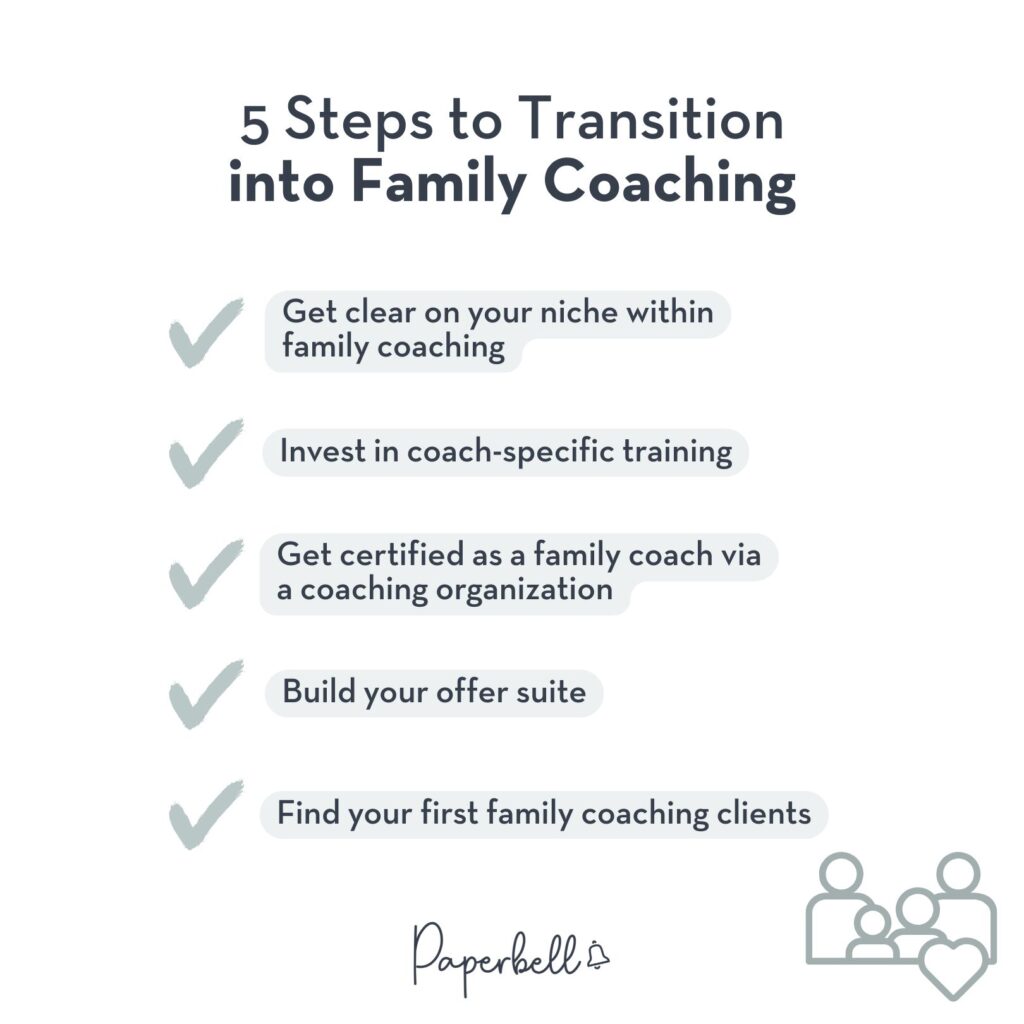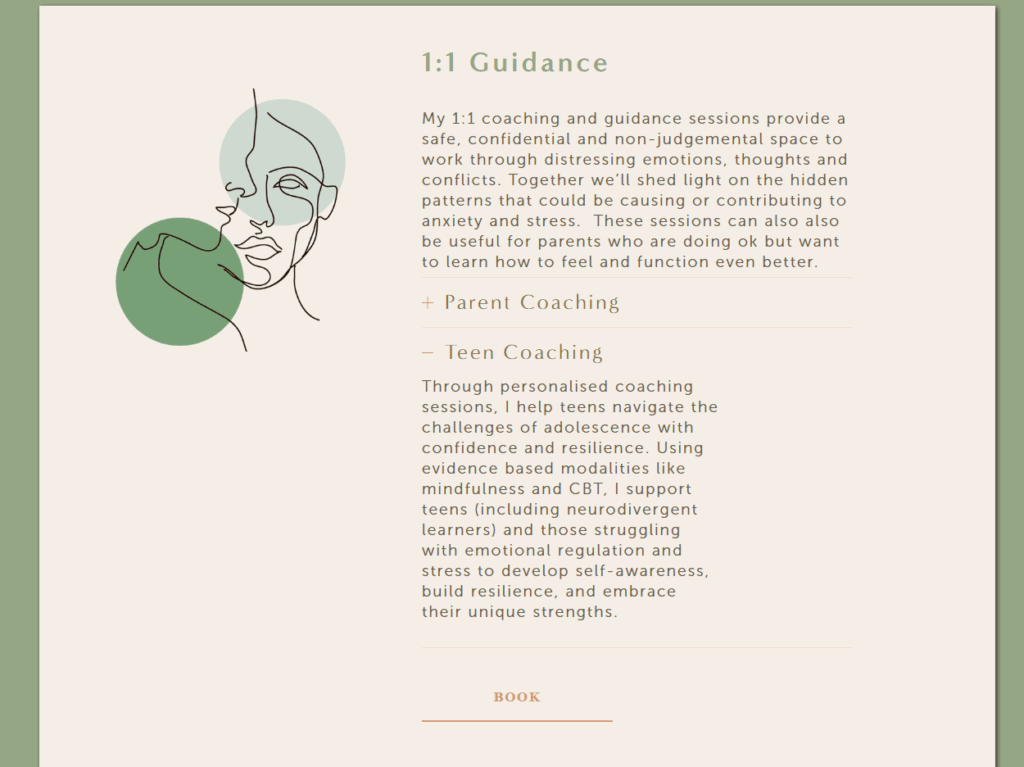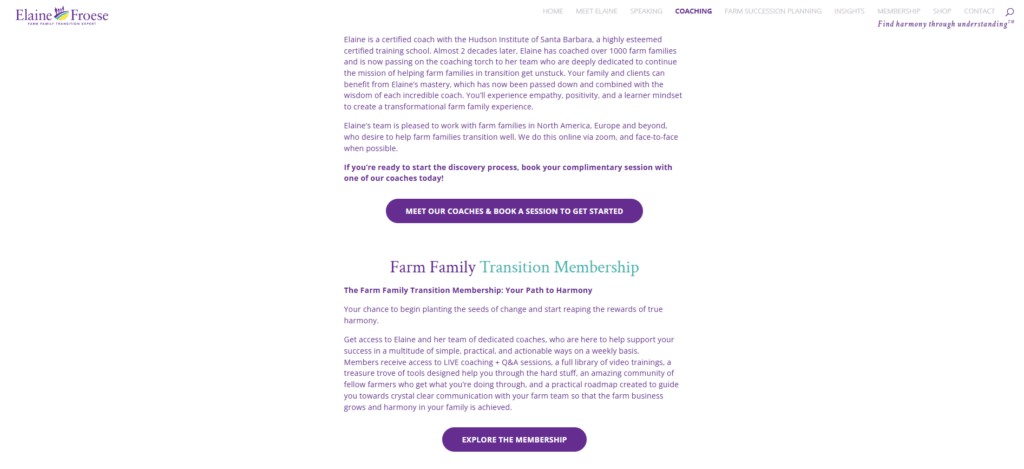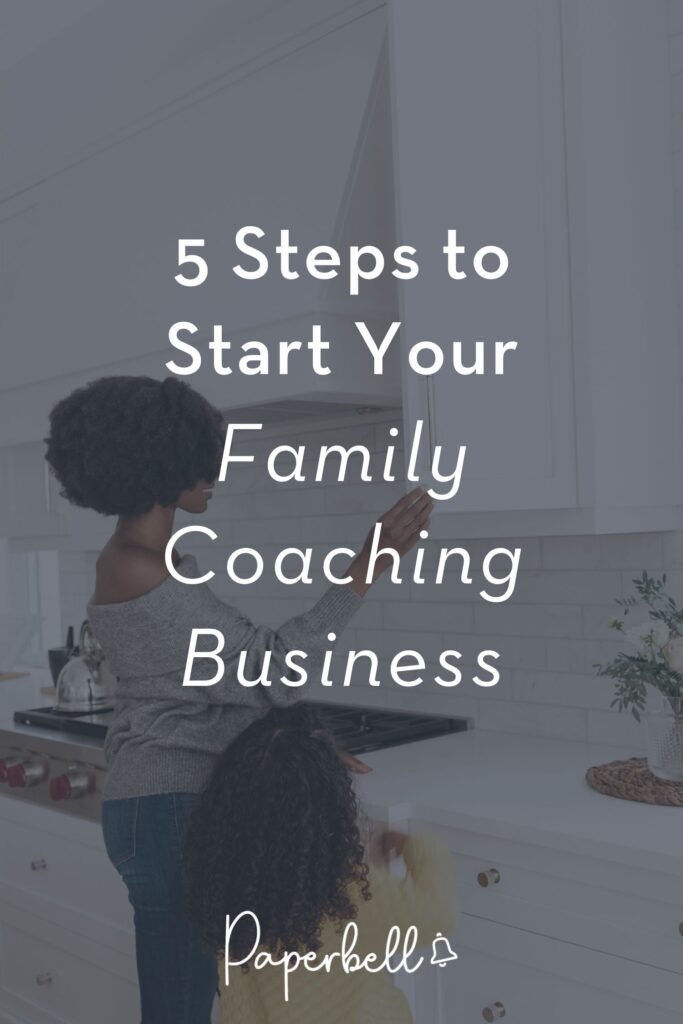Are you drawn to helping families navigate their most challenging seasons?
Do you have this inner drive to help, whether it’s teenagers testing boundaries, couples rebuilding trust, or households adjusting to major life changes?
Family dynamics are complicated. But that also makes it one of the most rewarding coaching niches out there. Truly, what makes a more profound impact on someone’s life than their family dynamics?
This guide explains what family coaching is, who it’s for, and how to get started, whether you’re looking to hire a coach or become one. If it’s the right fit, you’ll also learn how to launch a family coaching business.
What is a Family Coach?
A family coach is someone who works with families to improve their relationships, communication patterns, and overall functioning.
Unlike many other coaching niches that focus on individuals, family coaching addresses the family as a system. They do so because they recognize that change in one member affects everyone else.
Family coaches might help with:
- Improving communication between family members
- Navigating major life transitions (new baby, moving, divorce, etc.)
- Creating effective parenting strategies
- Establishing healthy boundaries and routines
- Building stronger relationships between siblings or between parents and children
- Managing conflict in constructive ways
- Balancing work and family life
They’re also different from parenting coaches, who focus on helping only the parental figures of the family, and not the children.
[ Read: 8 Benefits of Parent Coaching & How to Make It Your Career ]
If you can think of a family issue, then there’s a good chance a family coach can help with it.
How Family Coaching Differs from Family Therapy
“Wait… isn’t that just therapy?” I hear you asking.
Not quite. Yes, there’s some overlap there, but family coaching and family therapy serve different purposes and don’t rely on the same tools and approaches.
Family therapy typically:
- Is conducted by licensed mental health professionals
- Focuses on treating mental health issues and healing past trauma
- Often involves diagnosis and treatment of psychological conditions
- Tends to be past-oriented by exploring childhood experiences and patterns
- May be covered by health insurance
Family coaching, on the other hand:
- Can be practiced by certified coaches (without therapy licenses)
- Is solution-oriented rather than diagnosis-focused
- Emphasizes action plans and accountability
- Is typically more short-term and results-focused
- Usually isn’t covered by insurance
Here’s a simple way to think about it:
Therapy helps families heal, while coaching helps families grow.
When People Need a Family Coach
Families seek out coaching for many reasons, but here are the most common situations where a family coach can make a huge difference.
During Major Life Transitions
Change is hard. That’s especially true when it affects the whole family. A family coach can help during transitions like:
- Welcoming a new baby or adopting a child
- Blending families after remarriage
- Moving to a new city or country
- Transitioning children to new schools
- Adjusting to an empty nest when adult children leave home
- Incorporating elderly parents into the household
During these transitions, a family coach helps everyone adjust to new roles and routines while minimizing conflict and stress.
When Communication Breaks Down
We’ve all been there. Parents and kids talking past each other. Siblings who can’t get through a meal without fighting. Family members retreating to separate corners of the house to avoid interaction.
Communication breakdowns are one of the top reasons families seek coaching. A family coach can teach active listening skills while helping family members express needs in a clear and respectful way.
When Parenting Challenges Arise
As a mom myself, I’ll tell you that kids don’t come with instruction manuals. And what works for one child might fail completely with another.
Family coaches often work with parents who are struggling to adjust. But they can also work directly with the children, depending on their age, to create a safe space for all and help to get everyone’s needs met.
What’s important to remember is that a great family coach won’t try to force a specific family dynamic. Instead, they’ll support parents with their values while responding to each child’s unique needs.
How to Become a Family Coach
If you’re thinking about becoming a family coach, you’re considering a path that can be incredibly rewarding.
Here’s how to set yourself up for success in this field and start your own coaching business.
Build Essential Coaching Skills and Qualities
Before you invest in training, ask yourself if you have (or are willing to develop) these critical qualities:
- Empathy and warmth: Families need to feel safe and understood
- Neutrality: You must avoid taking sides between family members
- Boundaries: Clear professional boundaries are essential when working with multiple family members
- Cultural sensitivity: Families come from diverse backgrounds with different values and traditions
- Patience: Change in family systems takes time
- Flexibility: What works for one family won’t work for another
- Conflict management skills: You’ll need to navigate disagreements without escalating tensions
Without these skills, you’ll find it difficult to fully support your clients while keeping your well-being intact.
Have Background Experience That Transfers Well to Family Coaching
Many successful family coaches come from related fields, including:
- Teaching or education
- Social work
- Child development
- Parenting education
- Marriage or relationship coaching
- Life coaching
If you have experience in any of these areas, you already have transferable skills that’ll serve you well as a family coach.
5 Steps to Transition into Family Coaching

Ready to take the leap? Here’s a step-by-step guide to get into family life coaching.
1. Get clear on your niche within family coaching
Will you focus on specific types of families (military families, adoptive families, families with teens) or specific challenges (communication, work-life balance, discipline)?
For example, Lisa Swinburn specializes not only in parent coaching, but also in teen coaching, allowing her to specifically help families of teenagers.

2. Invest in coach-specific training
If you search “family coach training program” online, you’ll be bombarded with options. Not all programs are created equal, though, and choosing the right one is key for your professional development.
Look for programs accredited by a recognized coaching organization like the International Coaching Federation (ICF) or the Family Life Coaching Association (FLCA). These programs typically require 60-125 training hours and include supervised coaching practice.
While you can get certified through non-accredited programs, choosing an accredited one will give you stronger credentials and better preparation for the challenges of family life coaching. You’ll also get a much better family life education overall.
These programs will equip you with coaching tools and coaching techniques you wouldn’t get elsewhere.
3. Get certified as a family coach via a coaching organization
Once you attend coach training and complete your program, it’s time to apply for certification from recognized coaching organizations. If you choose the ICF path, you can pursue one of three certification levels:
- Associate Certified Coach (ACC) – perfect for new coaches
- Professional Certified Coach (PCC) – requires 500+ hours of experience
- Master Certified Coach (MCC) – for veteran coaches with 2,500+ hours
The professional coaching certification process typically involves submitting coaching logs, completing performance evaluations, and passing an exam so that regulators can assess coaching mastery. You may also need to complete mentor coaching hours if these weren’t included in your program.
4. Build your offer suite
Now that you’re certified and have some coaching mastery under your belt, it’s time to create your coaching packages and offer suite.
Keep in mind that an “offer” is more than just coaching sessions. It’s the transformation you promise.
For example:
“I’ll help your family reconnect and communicate effectively after a major life transition.”
Work backward from this promise to design your packages. How many sessions will families need? Should you meet weekly or bi-weekly? Will you need separate sessions with parents alone? What tools and resources will families need between sessions?
For example, Elaine Froese, who specializes in farm families, offers both one-on-one coaching packages as well as a more affordable membership.

5. Find your first family coaching clients
With your offers in place, it’s time to find your first coaching clients! Start with people in your network who might benefit from family coaching or who could refer families to you.
Consider offering a few pro bono or reduced-rate packages to build experience and collect testimonials. These early case studies will be invaluable for attracting paying clients later.
You can also join platforms like coaching directories or a coach referral service to start building your coaching community.
Using Paperbell to Manage Family Coaching Packages and Sessions
Managing multiple family members, complex scheduling, and various resources can get overwhelming quickly.
This is where Paperbell shines for family coaches.
With Paperbell, you can:
- Create custom coaching packages and automate scheduling
- Allow families to book sessions at times that work for everyone
- Share worksheets, pre-session forms, and other resources securely
- Collect payments, including recurring plans
- Give families access to a client portal for easy scheduling and materials
- Track session notes and family progress in one place
But that’s not all! You can even launch your own professional coaching website without a separate website platform using Paperbell.
Plus, families get their own client portal where they can access all their materials, scheduling, and payment information in one place. All this allows you to focus on your own coaching excellence without getting bogged down with the complicated admin side of a business.
FAQs About Family Coaching
How to help someone with family issues?
Listen with empathy, help them spot patterns, and support them in setting goals. Guide them to create practical strategies and encourage steady progress as family dynamics shift.
How to be a family life coach?
Start with accredited life coach training, then specialize in family systems. Earn certification from a reputable life coach organization and build experience with real families.
What’s the difference between family coaching and family therapy?
Coaching focuses on present goals and practical change. Therapy explores past issues and mental health. Coaching doesn’t require a license or insurance, but both can be helpful.
How much should I charge for family coaching?
Beginner coaches charge $100–$175 per session; experienced ones ask $200–$350+. Packages often range from $1,500–$5,000, depending on duration, support, and coach expertise.
Ready to Launch Your Family Coaching Practice?
Family life coaching offers a meaningful way to make a difference while building a sustainable coaching business.
As families face increasing pressures from all directions, the need for skilled family coaches continues to grow.
If you’re ready to start or grow your family life coaching journey, Paperbell makes it easy to launch your website, create professional coaching packages, manage multiple family members, and keep all your resources organized in one place.
Try Paperbell free today and see how it helps family coaches spend less time on admin and more time supporting their clients.










